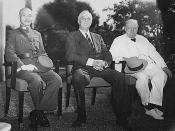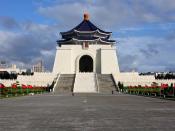Every action has a reason, and Japan's reason for the invasion of China was purely land, in quality and quantity. Manchuria or as it was later renamed by the Japanese Manzhouguo proved to be an excellent source for forestry, minerals, and agricultural products in addition to being under populated for the size. Once captured the Japanese did all they could to protect their investment in Manchuria, took control of the major mines, railways, factories, ports, and even built up the south Manchurian railway. All this was threatened by the usurp of China by Chiang Kai Shek representing the Nationalists. Consequently the Japanese assassinated the current puppet warlord of Manchuria - Zhang Zuolin, and put his successor and son in his place. This happened to be convenient for the Japanese as the son would be just as easy to control being a gambling drug addict.
The conflict then widened as the Japanese were strong traders with the Americans at the time and therefore were equivalently hit by the crash of the stock market.
A weakened Japanese economy meant loss in trade, which would result in a decrease in materials, and factory shut downs which would then result in a loss of jobs. At which time the idea of further expansion came into play, which would revive the economy, somewhere convenient, in which the land could be harvest and put to beneficial use; this place was described before was Manchuria, and to japans further advantage had already deployed troops. Although the full take over was an inside plan, not supported by the Japanese government. The Japanese then disbanded Zuolin, and placed Puyi the ex-emperor as the new puppet leader. This was followed by a trade boycott on Japan by Chinese trading ports in which Chinese firms no longer supplied Japanese made goods.


